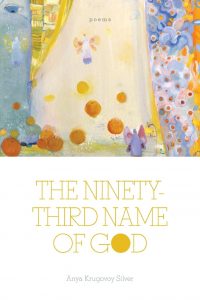Think, Question, and Connect
Each week, we’ll debut curated digital content on a variety of different topics. Every edition will follow a loose theme, featuring articles and content from us and our friends and partners.

April is National Poetry Month, so it felt most fitting that our next edition of curated digital content would feature some of the poets who move us and make us.
Poetry is one of our most intimate expressions of language—for centuries, we’ve relied on poets who articulate our most personal feelings and our trials and tribulations in a way that we can digest and understand.
At least once, we’ve all read a poem that we connect with—where the poet has managed to put into words a part of ourselves we knew existed, but lacked the words to explain.
Poems are spectacular because we may all read the same stanza on a page (or screen), but it brings each of us different meanings, different understandings, based on our own human experiences. The words of poets allow the deepest parts of ourselves to feel seen—and that is what makes them most beautiful.
This selection of poets is not designed to speak for all who could be featured, but we hope it sparks your interest to dig deeper and learn more about the poets whose works we now reflect back on, and those who still have more to say. All of them have changed the landscape of how we express what it means to be human.
We’re still here—at least six feet apart and with fewer than six degrees of separation—reminding you that although we may be distanced, we aren’t disconnected.
—Georgia Humanities
Quick Guide
Learn more about Judith Ortiz Cofer (1952–2016) in the New Georgia Encyclopedia.
Watch Jericho Brown‘s TEDxTalk, “The Art of Words.”
Read more about Anya Krugovoy Silver (1968–2018) in one of the latest articles from the New Georgia Encyclopedia.
Listen to Ilya Kaminsky read from his selected works on the VS Podcast, presented by the Poetry Foundation.

“I always have to explain that I am so old I was one of the original Latina writers. I didn’t have Latina writers to be inspired by. The first works in English published in the United States by Latina writers were Julia Alvarez, Sandra Cisneros, and me. And there were a bunch of men who were called the Nuyorican School, right, so . . . they were the boys, and they didn’t want the girls. Julia, Sandra, and I were the first generation to be college educated and bilingual. Before that, if you wanted to read a Latina writer, you had to get a translation. So I’m not saying we were the only first, but we were the first to reach a wider audience, because we were writing in standard English, not Spanglish or in translation. I only knew that I wanted to write, that I was an American writer if I wanted to call myself that, and so I was.”
—Judith Ortiz Cofer, in an interview with the Georgia Review
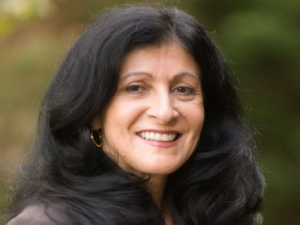
Judith Ortiz Cofer, University of Georgia Photographic Services.
Judith Ortiz Cofer (1952–2016), a longtime resident of Georgia, was one of a number of Latina writers who rose to prominence during the 1980s and 1990s. Her stories about coming-of-age experiences in Puerto Rican communities outside of New York City and her poems and essays about cultural conflicts of immigrants to the U.S. mainland made Ortiz Cofer a leading literary interpreter of the U.S.—Puerto Rican experience.
When she was fifteen years old, Ortiz Cofer moved with her family to Augusta. In 1984 she joined the faculty of the University of Georgia, and by her retirement in 2013, she was the Regents’ and Franklin Professor of English and Creative Writing.
Although Ortiz Cofer is best known for her works of creative fiction, her first literary expressions were in poetry. Her works reflected on a range of topics from grief to language and communication, and she even authored two young adult novels. One of her early chapbooks, Peregrina (1986), won the Riverstone International Chapbook Competition. She published various other collections of poetry, including Terms of Survival (1987), Reaching for the Mainland (1995), and A Love Story Beginning in Spanish (2005). Ortiz Cofer’s first and critically-acclaimed novel, The Line of the Sun (1989), was nominated for the Pulitzer Prize.
In 2010, Ortiz Cofer was inducted in the Georgia Writers Hall of Fame and in 2011 received the Governor’s Award in the Humanities (now the Governor’s Awards for the Arts and Humanities).
“They play their pianos
in the late afternoon
tilting their heads
at a gracious angle
as if listening
to notes pitched above
the human range.
Age makes them translucent;
each palpitation of their hearts
visible at temple or neck.
When they die, it’s in their sleep,
their spirits shaking gently loose
from a hostess too well bred
to protest.”
—Excerpt, “Women Who Love Angels,” Judith Ortiz Cofer, The Latin Deli (1993)
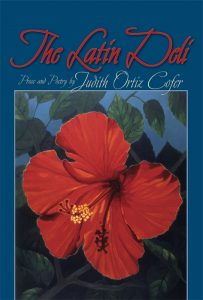
Learn more about Judith Ortiz Cofer in the New Georgia Encyclopedia.
Read the full interview with Ortiz Cofer and Alan Flurry, published in the Georgia Review.
Watch Ortiz Cofer’s interview with the Georgia Writers Hall of Fame.

“Poems can only approximate, which is perfect — they should only approximate. That’s why when you read a poem, or I read a poem, we see different things. One of the ways in which you know you have a poem is that everyone who sees it has a different reading of it, and that reading is still based on the text of the poem. I’m trying to write poems that make you stay inside the poem, and yet the entire time that you’re inside the poem, you’re also asking it questions. You’re asking it questions because it’s asking you questions and you’re interacting. If you have enough interactions with the poem, you will eventually began to have changes of mind, changes in ways of being.”
—Jericho Brown, in conversation with ArtsATL
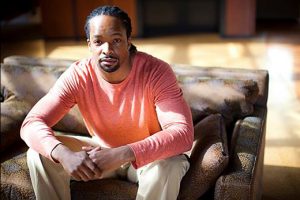
Jericho Brown, Emory University.
Jericho Brown, a native of Shreveport, Louisiana, worked as a speechwriter right out of college for the mayor of New Orleans, Marc Morial (1994–2002). He describes the experience as his first big break, and a “training ground” for his career that taught him to work under tight deadlines, and offered the opportunity to write every day, whether it was speeches, press releases, or ghostwriting columns on the mayor’s behalf. Brown left that post to pursue his Ph.D. in literature and creative writing from the University of Houston.
Brown’s first book of poetry, Please (2008), won the American Book Award. His second collection, The New Testament (2014), won the Anisfield-Wolf Book Award. He is the recipient of fellowships from the Guggenheim Foundation and the National Endowment for the Arts, among others, and is also a recipient of the Whiting Writer’s Award.
Brown’s poems explore sexual identity, racial injustice, religion, the intersection of love and violence, and his experience as a gay black man living in the South. Of his work, Brown says, “I became interested in writing as a space where you could put things you couldn’t necessarily talk about in the grocery store line, but that you knew existed. Things I began to understand that people couldn’t talk about but could be written about.”
Brown’s third poetry collection, The Tradition (2019), was named a finalist for the National Book Award in Poetry. He is currently an associate professor of English and creative writing at Emory University and director of the creative writing program.
“We work, start on one side of the day
Like a planet’s only sun, our eyes straight
Until the flame sinks. The flame sinks. Thank God
I’m different. I’ve figured and counted. I’m not crossing
To cross back. I’m set
On something vast. It reaches
Long as the sea. I’m more than a conqueror, bigger
Than bravery. I don’t march. I’m the one who leaps.”
—Excerpt, “Crossing,” Jericho Brown, The Tradition (2019)

Read Jericho Brown’s profile in the Atlanta Journal-Constitution.
Watch Jericho Brown’s TEDxTalk, “The Art of Words.”
Listen to Jericho Brown’s Spotify playlist, curated to accompany his latest poetry collection, The Tradition.
Read Jericho Brown’s full Q&A with ArtsATL.

“I think that as a culture we are very ‘illness phobic.’ We don’t talk about it a lot. I want to resist that narrative and to be able to speak honestly about the difficulties of life both for people who are experiencing it and might feel alone in their experience. Also, for people who haven’t experienced it, so that they can understand what it’s like to feel this pain and uncertainty. I think that good writing has to be honest and if it’s not completely honest, then it’s not living up to what it could do.”
—Anya Krugovoy Silver, discussing her poetic identity with GPB’s Celeste Headlee

Anya Krugovoy Silver, Mercer University.
Anya Krugovoy Silver (1968–2018) was an award-winning poet, scholar, and professor who resided in Georgia for more than half of her life. From 2004 until her death in 2018, she lived with inflammatory breast cancer (a rare and aggressive form of breast cancer), which was an experience she explored in her four collections of poetry.
She grew up in Swarthmore, Pennsylvania, as the child of immigrants, and her first two languages were German and Russian. She began writing poems in elementary school, and her love for poetry carried on through the rest of her life.
In 1998, Silver accepted a faculty position in the English department at Mercer University in Macon. Her debut collection of poetry, The Ninety-Third Name of God, was published in 2010. Although some of the poems were written before her diagnosis, the central subject shaping the work (and each of her subsequent works) is how a life-threatening illness affects one’s spirituality, sexuality, and relationships. The poems do not shy away from presenting the realities of suffering, yet many are infused with joy and gratitude.
In I Watched You Disappear (2014), Silver explores the dichotomy between chronic illness and faith, and the work earned her the Georgia Author of the Year Award for Poetry in 2015. She subsequently published From Nothing in 2016, and Second Bloom in 2017. The following year, she was named a Guggenheim Fellow for Poetry.
In 2019, Georgia Author of the Year honored Silver with a posthumous Lifetime Achievement Award. A forthcoming production, IV, a two-part documentary play, is anchored by Silver’s works and written and produced by her husband, Andrew Silver. Its forthcoming Georgia debut and accompanying discussion are supported in part by a grant from Georgia Humanities.
“Before me, life—mysterious, ordinary—
holding off pain with its muscular wings.
As I step to the curb, an orange moth
dives into the basket of roses
that lately stood on my sickroom table,
and the petals yield to its persistent
nudge, opening manifold and golden.”
Excerpt, “Leaving the Hospital,” Anya Krugovoy Silver, The Ninety-Third Name of God (2010)
Read more about Anya Krugovoy Silver, in one of the latest articles from the New Georgia Encyclopedia.
Listen to Anya Krugovoy Silver’s full interview with GPB’s Celeste Headlee.
Watch Anya Krugovoy Silver’s poetry reading from her selected works at the Burlington Book Festival.

“I am a love poet, or a poet in love with the world. It is just who I am. If the world is falling apart, I have to say the truth. But I don’t stop being in love with that world.”
—Ilya Kaminsky, in an interview with Poets & Writers Magazine
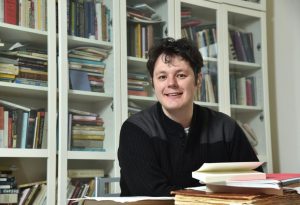
Ilya Kaminsky, photo by Hyosub Shin, the Atlanta Journal-Constitution.
Ilya Kaminsky was born in the former Soviet Union city of Odessa in 1977. He lost the majority of his hearing at the age of four, when a doctor misdiagnosed his case of mumps as a harmless cold.
Kaminsky was writing poetry from a young age, and after a publisher visited his class one school day, he soon found himself writing poetry and articles for official and unofficial newspapers in Odessa.
When Kaminsky was sixteen, his family was granted political asylum in the United States, and his father died shortly thereafter. Kaminsky began writing poems in English to process his father’s death, telling the Adirondack Review, “I [chose] English because no one in my family or friends knew it—no one I spoke to could read what I wrote. I myself did not know the language. It was a parallel reality, an insanely beautiful freedom. It still is.”
Kaminsky’s first poetry collection, Dancing in Odessa (2004), won the Tupelo Press Dorset Prize and the American Academy of Arts and Letters’ Metcalf Award. His most recent collection, Deaf Republic (2019), was a finalist for the National Book Award in Poetry. His poems have been translated to more than twenty languages, and Kaminsky, in an interview with Poets & Writers Magazine, stated, “I fiercely resist being pigeonholed as a ‘Russian poet’ or ‘immigrant poet’ or even ‘American poet.’ I am a human being. It is a marvelous thing to be.”
Kaminsky’s poetry takes on issues of social justice, inclusion, diversity, privilege, love, grief, and joy. Kaminsky is the Bourne Chair in Poetry at Georgia Tech, and the director of the Poetry@Tech program, which brings poets of national and international acclaim to Atlanta.
“And when they bombed other people’s houses, we
protested
but not enough, we opposed them but not
enough. I was
in my bed, around my bed America
was falling: invisible house by invisible house by invisible house.”
—Excerpt, “We Lived Happily during the War,” Ilya Kaminsky, Deaf Republic (2019)
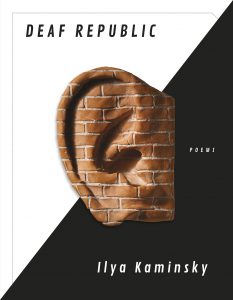
Read Ilya Kaminsky’s full interview with Poets & Writers Magazine.
Listen to Kaminsky’s interview and poetry reading on the VS Podcast, presented by the Poetry Foundation.
Watch Ilya Kaminsky read from his latest poetry collection, Deaf Republic.

In honor of National Poetry Month, we have selected a few poetry podcasts to help you celebrate poetry and poets, from the comfort of your home, whether you have 5 minutes or an hour or more.
If you have one minute….

Poem-a-Day, Academy of American Poets
A daily poetry series publishing new work by contemporary poets.
U.S. Poet Laureate Joy Harjo is curating the poetry selection in April.
If you have 10 minutes….
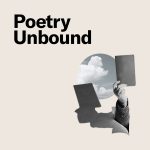
Poetry Unbound, On Being Studios
Each Monday and Friday, Pádraig Ó Tuama explores a single poem.
If you have an hour….

The VS Podcast, the Poetry Foundation
Hosted by poets Danez Smith and Franny Choi, this podcast welcomes guest poets to explore what moves them.
Check back each week for the latest edition of curated digital content, or subscribe to our newsletter below.

